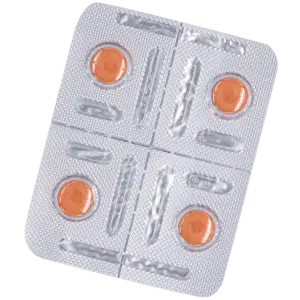The first step you can take to keep your risk of side effects as low as possible will be at your initial consultation. Ensure you give your prescriber your full medical history including any medication you take or medical conditions you may have.
Some medication and medical conditions will mean that Levitra isn’t the best ED treatment for you, your clinician will know what these are. Giving them all the information you can allows them to make the best decision for you and will lower the chance of you experiencing any side effects from your treatment.
If you do experience side effects after you begin treatment, let your doctor know, they may consider lowering your dose or switching you to a different ED medication.
Which medications can cause Levitra interactions?
Levitra, or vardenafil, the active ingredient in Levitra, may interact with nitrate drugs, antihypertensives and alpha-blockers, which lower blood pressure. It’s important to let your prescriber know at your initial consultation if you take any of these medications as it may mean that Levitra isn’t the best option for you.
Other vardenafil interactions include antidepressants, antibiotics, antifungals, medications for a prostate disorder, and HIV/AIDS medicine. Again let your prescriber know if you take any of these before beginning treatment with Levitra and let them know if you start taking them once you’ve already begun treatment.
I have pre-existing conditions. Can I still use Levitra?
There are a few pre-existing conditions which may mean your doctor will need to closely monitor your progress when being treated with Levitra. Or they may indicate a lower dosage starting point, these include:
- Irregular heartbeat
- Inherited heart diseases
- Peyronie’s disease (where the penis is curved)
- Sickle cell disease
- Multiple myeloma
- Leukaemia
- Stomach ulcers
- Bleeding disorder (such as haemophilia)
If any of the following applies to you it may be that you cannot take Levitra and you must tell your prescriber at your consultation:
- Severe heart or liver problems
- If you are having kidney dialysis
- If you’ve recently had a stroke
- If you’ve recently had a heart attack
- If you have low blood pressure
- If you have a family history of degenerative eye diseases
- If you’ve ever had a condition involving loss of vision
Who shouldn’t use Levitra?
If you’re allergic to vardenafil or any other ingredients contained in Levitra you shouldn’t use it. Signs of an allergic reaction include a rash, itching, swollen face, swollen lips and shortness of breath, so if you experience any of these let your doctor know immediately.
Levitra is not approved for men under 18 years old and may also not be suitable for men over 75 years old, your clinician will be able to judge if Levitra is suitable for you. If you take any medications that may interact with vardenafil, such as nitrate drugs for chest pain, then it’s important to let your prescriber know as these taken with Levitra can dangerously affect blood pressure. Again, it may be the case that you shouldn’t use Levitra and another ED treatment will be more suitable.
Levitra atrial fibrillation is when the heart rate is irregular and often abnormally fast after treatment with vardenafil. It’s a rare condition with only a handful of case studies and normally occurs in healthy men with no history of erectile dysfunction who have taken Levitra. So if you don’t have ED, you should not take Levitra.
What if my health changes when I’m taking Levitra?
Let your clinician know. If you’re prescribed a new medication that you weren’t taking when you first started with Levitra it may interact with it. Equally, if your health changes, discuss this with them too.
Your prescriber will be able to judge whether Levitra is still right for you, whether lowering your dose may be an option or whether a different ED treatment would be better.


